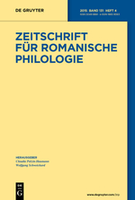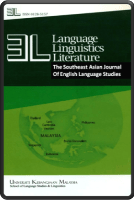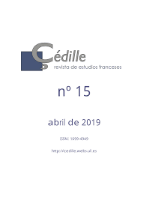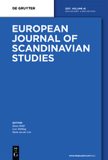
Romanica Olomucensia
Scope & Guideline
Fostering Interdisciplinary Insights in the Arts and Humanities
Introduction
Aims and Scopes
- Interdisciplinary Approach to Language Studies:
The journal emphasizes an interdisciplinary perspective, exploring the intersections of linguistics, literature, and cultural studies, which allows for a comprehensive understanding of language in various contexts. - Focus on Phraseology and Translation:
A significant portion of the publications is dedicated to phraseology, idiomatic expressions, and translation studies, highlighting the complexities of language use across different cultures and languages. - Cultural and Literary Analysis:
The journal features in-depth analyses of literary works from various Romanic traditions, examining thematic elements, narrative structures, and cultural significances. - Applied Linguistics and Language Didactics:
There is a consistent focus on applied linguistics, particularly in the realm of teaching methodologies and language acquisition, providing valuable insights for educators and researchers alike. - Historical and Contemporary Linguistic Studies:
The journal publishes research that spans historical linguistics as well as contemporary language use, reflecting on the evolution of languages and their socio-cultural contexts.
Trending and Emerging
- Digital Humanities and Corpus Linguistics:
There is a growing trend towards the application of digital humanities and corpus linguistics, reflecting the increasing importance of technology in language studies and the analysis of large linguistic datasets. - Intercultural Communication and Identity:
Research focused on intercultural communication and the negotiation of identity in multilingual contexts is emerging, highlighting the journal's commitment to exploring the complexities of modern societal interactions. - Narrative and Body Studies:
An increasing number of publications delve into narrative techniques and corporeal representations in literature, indicating a trend towards understanding the relationship between body, identity, and narrative. - Translation and Cultural Mediation:
The journal is increasingly addressing the role of translation as a form of cultural mediation, reflecting the globalized nature of literature and the importance of translation in cross-cultural exchanges. - Sociolinguistics and Language Variation:
There is a noticeable rise in sociolinguistic studies that examine language variation and its social implications, emphasizing the journal's engagement with contemporary linguistic issues.
Declining or Waning
- Traditional Literary Canon Studies:
There appears to be a waning interest in strictly traditional literary canon studies, as more contemporary and diverse voices in literature gain prominence, indicating a shift towards inclusive literary analysis. - Narrowly Defined National Literatures:
Research that focuses exclusively on national literatures is less common, as the journal increasingly embraces transnational and comparative studies that reflect the complexities of modern cultural identities. - Linguistic Purism:
Themes surrounding linguistic purism and prescriptive approaches to language are declining, giving way to more descriptive and inclusive studies that acknowledge linguistic variation and change in contemporary contexts.
Similar Journals

Chuzhdoezikovo Obuchenie-Foreign Language Teaching
Connecting Scholars in Foreign Language EducationIntroducing Chuzhdoezikovo Obuchenie - Foreign Language Teaching, a prominent journal published by NATSIONALNO IZDATELSTVO AZ BUKI, dedicated to the field of foreign language education. With its ISSN 0205-1834 and E-ISSN 1314-8508, this journal aims to provide a comprehensive platform for researchers, educators, and practitioners to share insightful studies, innovative methodologies, and transformative practices in language teaching. The journal is based in Sofia, Bulgaria and is strategically positioned to contribute to the discourse on language acquisition and pedagogy, targeting a global audience interested in enhancing foreign language competencies. Although specific impact factors and H-index data may be unavailable, the journal's commitment to quality and relevance in the field is evident through its rigorous peer-review process, ensuring that published works meet high academic standards. Emphasizing accessibility and inclusivity, Chuzhdoezikovo Obuchenie invites submissions that reflect contemporary challenges and advancements in language education, making it an essential resource for anyone invested in the future of multilingual instruction.

BOLETIN DE LA REAL ACADEMIA ESPANOLA
Elevating Discourse in Linguistics and LanguageBOLETIN DE LA REAL ACADEMIA ESPANOLA, published by the Real Academia Española, serves as a central conduit for scholarly discourse in the fields of Linguistics and Language. With an ISSN of 0210-4822 and an E-ISSN of 2445-0898, this esteemed journal has been disseminating impactful research since its inception in 2003. As a recognized Q2 journal in Linguistics and Language for 2023, it ranks in the 45th percentile in Arts and Humanities and 42nd percentile in Social Sciences according to Scopus metrics, reflecting its solid position in academic circles. Although not an open-access journal, it remains a crucial resource for those engaged in the vibrant study of language, providing insights that inform both theoretical frameworks and practical applications. Researchers, professionals, and students alike will find prominent studies and discussions that contribute to the evolution of linguistic scholarship. The journal is published in Madrid, Spain—an environment rich in linguistic heritage that further enhances its significance in the global academic community.

ZEITSCHRIFT FUR ROMANISCHE PHILOLOGIE
Illuminating the Intricacies of Romance Linguistics and LiteratureZEITSCHRIFT FUR ROMANISCHE PHILOLOGIE, published by Walter de Gruyter GmbH, stands as a prominent peer-reviewed journal dedicated to the fields of Linguistics, Literature, and Literary Theory. Established in 1877 and continuing its legacy to the present day, this esteemed journal offers a platform for comprehensive scholarship that explores the intricacies of Romance languages and their literary heritage. With a notable Q1 ranking in Literature and Literary Theory and a Q2 ranking in Linguistics and Language, it has secured its place among leading resources in the humanities. Researchers, educators, and students benefit from its rich historical context and current contributions to the understanding of Romance languages and literature. Though currently not available as Open Access, the journal prioritizes the dissemination of high-quality research, making significant strides in fostering academic dialogue and advancement. Its address at Genthiner Straße 13, Berlin, Germany, situates it in a hub of scholarly activity, bridging the past with contemporary literary discourse.

3L-Language Linguistics Literature-The Southeast Asian Journal of English Language Studies
Connecting Scholars Across the Southeast Asian Linguistic Landscape3L-Language Linguistics Literature - The Southeast Asian Journal of English Language Studies is a prestigious academic journal published by Penerbit Universiti Kebangsaan Malaysia, showcasing the dynamic field of linguistics, language studies, and literature. With an open access policy since 2006, this journal aims to disseminate high-quality research and critical analyses, catering to an international audience of researchers, academics, and practitioners. The journal has achieved impressive rankings, positioning it in the Q2 category for Linguistics and Language, and Q1 for Literature and Literary Theory in 2023, reflecting its significant impact in these fields as evidenced by a remarkable Scopus ranking of #27/1106 in Literature and Literary Theory, placing it in the 97th percentile. This makes 3L an essential resource for those seeking to engage with contemporary issues and innovations within the Southeast Asian context and beyond. With a commitment to advancing knowledge in language and literature, 3L fosters a vibrant scholarly community dedicated to excellence in research.

Cedille-Revista de Estudios Franceses
Unveiling the Intricacies of French Culture and LanguageCedille-Revista de Estudios Franceses is a prominent academic journal published by the ASOC PROFESORES FRANCES UNIV ESPANOLA-APFUE and has established itself as a vital resource in the fields of Linguistics and Language and Literature and Literary Theory. Since its inception in 2005, this Open Access journal has provided a platform for rigorous scholarly articles and critical studies focused on French studies, fostering both research and discussion among academics from around the globe. Originating from Santa Cruz de Tenerife, Spain, Cedille has garnered a respectable impact factor and ranks in the second quartile for Linguistics and Language and the first quartile for Literature and Literary Theory in 2023. With converged years from 2009 to 2024, the journal aims to advance understanding and appreciation of French literature and its linguistic intricacies, serving as a vital forum for researchers, professionals, and students committed to the exploration of French culture and language studies.

Cadernos de Letras da UFF
Unveiling New Perspectives in Literature and LinguisticsCadernos de Letras da UFF is a prominent academic journal published by the Department of History at the Federal University of Fluminense in Brazil. Since its transition to Open Access in 2014, it has fostered a spirit of collaboration and dissemination in the field of Literature and Linguistics, welcoming contributions that explore various aspects of literary studies, historical literature contexts, and linguistic phenomena. With a commitment to quality and academic rigor, the journal serves as a vital resource for scholars, practitioners, and students engaged in the humanities. The journal is dedicated to the advancement of knowledge through innovative research and critical analyses, making it an essential platform for sharing ideas with a global audience. The journal is based in Niterói, RJ, Brazil, and is indexed in various academic databases, enhancing its visibility and impact within the scholarly community.

European Journal of Scandinavian Studies
Illuminating linguistic diversity and literary depth.European Journal of Scandinavian Studies is an esteemed journal published by Walter de Gruyter GmbH, dedicated to advancing scholarship in the fields of Cultural Studies, Linguistics and Language, and Literature and Literary Theory. Since its inception in 2010, the journal has been a pivotal platform for researchers and scholars, showcasing cutting-edge research and critical discussions pertaining to Scandinavian languages and cultures. With an ISSN of 2191-9399 and an E-ISSN of 2191-9402, the journal emphasizes accessibility to impactful academic work, despite its current non-open access model. While the journal is categorized within the Q4 quartile for Cultural Studies and Linguistics/Language, it has shown notable potential in ranking higher in its specialized domains, fostering a growing community of researchers invested in Scandinavian studies. The journal's office is located in Berlin, Germany, further enriching its European scholarly context. As it continues to evolve, the European Journal of Scandinavian Studies serves as a vital resource for academics seeking to engage deeply with the multifaceted aspects of Scandinavian culture and linguistics.

Revista Signos
Empowering Voices in the World of Linguistics and LiteratureRevista Signos, a prestigious publication by EDICIONES UNIV VALPARAISO, serves as a vital platform for scholars and practitioners in the fields of linguistics, language, literature, and literary theory. With an impact factor underscoring its academic excellence, the journal holds a commendable Q2 ranking in Linguistics and Language and a Q1 ranking in Literature and Literary Theory as of 2023. Its strong performance on Scopus, with ranks placing it in the 97th and 75th percentiles, respectively, illustrates its influential role in shaping contemporary discourse within these domains. Based in Chile, this journal not only disseminates critical research but also fosters intellectual dialogue, making it an essential resource for researchers, students, and professionals alike. Although it operates without open access, its commitment to quality and depth provides invaluable insights into the evolution of language and literature over its convergence years from 2007 to 2024. Engage with Revista Signos to explore the rich tapestry of linguistic and literary scholarship.

Academic Journal of Modern Philology
Connecting Scholars Through Innovative ResearchWelcome to the Academic Journal of Modern Philology, a premier platform dedicated to advancing the field of philology and linguistics. Published by the esteemed Committee Philology Polish Academy of Sciences, Wroclaw Branch, this open-access journal has been committed to disseminating high-quality research since 2014, ensuring widespread access and engagement within the scholarly community. With an ISSN of 2299-7164 and an E-ISSN of 2353-3218, the journal invites contributions that push the boundaries of contemporary philological inquiry, bridging traditional scholarship with modern linguistic challenges. Situated in Poland's vibrant academic milieu, it aims to foster interdisciplinary dialogue while highlighting the importance of philology in understanding cultural and linguistic diversity. Researchers, professionals, and students alike will find a wealth of insightful articles that contribute to the evolving landscape of modern language studies.

LINGUA E STILE
Cultivating High-Quality Research Across Multiple DisciplinesLINGUA E STILE, published by SOC ED IL MULINO, is a distinguished academic journal based in Italy that delves into the intricate realms of linguistics, literature, and philosophy. With an ISSN of 0024-385X, this journal has been a vital platform for scholarly discourse since its inception, covering a broad spectrum of topics from linguistic theory to literary analysis. Although it currently holds a Q4 category ranking in 2023 across multiple disciplines—specifically in Linguistics and Language, Literature and Literary Theory, and Philosophy—it remains committed to fostering insightful contributions that challenge and expand conventional understanding in these fields. While it does not offer open access, the journal diligently focuses on publishing high-quality research that appeals to academics, professionals, and students alike. With the convergence of multi-disciplinary approaches, LINGUA E STILE is positioned to engage with contemporary debates and developments, enriching the academic landscape from its base in Bologna, Italy, and inviting contributions that exemplify the evolving intersections of language and thought.